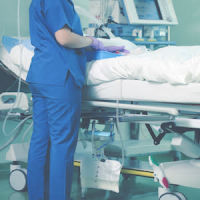Critical care physicians often use ineffective treatments that lack evidence-based data. This is especially true for delirium. To date, no medications have demonstrated therapeutic benefit for this condition. Medical treatment is either targeted toward preventing delirium or treating agitation associated with it. Behavioural interventions are rarely incorporated.
Delirium has a high incidence among critically ill patients. Approximately 32% of patients admitted to the ICU suffer from this condition. This number can increase to 80% in patients who are mechanically ventilated. Management of delirium can be quite challenging and expensive and can also result in increased length of stay in the hospital and the ICU and poor patient outcomes.
Patients suffering from delirium are at higher risk of hospital-related falls, functional decline, cognitive impairment, and higher mortality. However, delirium is a preventable condition in nearly 30 to 40% of cases. Findings from a recent study show a 53% reduction in the incidence of delirium with the intentional implementation of non-pharmacological interventions.
Delirium is a brain function characterised by an acute onset of fluctuating mental status, inattention, disorganised thinking and altered level of consciousness. These features are often the result of sleep deprivation. Delirium can also contribute to disrupting sleep. However, sleep deprivation is a modifiable risk factor. Improving sleep patterns of critically ill patients by minimising nighttime distraction, reducing noise and light exposure, and using eye masks and earplugs can help reduce episodes of delirium.
Multicomponent non-pharmacological interventions can effectively reduce the incidence of delirium and falls in elderly patients. However, despite the lack of evidence, medications are widely used for delirium management. These include typical and atypical antipsychotics and sedatives. While these medicines may be beneficial for some patients, there is also a risk that patients may harm themselves or others. There is no clinical evidence that shows the benefits of these drugs over placebo in terms of delirium-free days, physical restraints use, or length of stay in the hospital and the ICU. In addition, antipsychotics can have significant adverse effects, including arrhythmia and prolonged QTc.
So far, there is no known effective pharmacological treatment for delirium. This makes the treatment of this condition even more challenging, keeping in mind that critically ill patients often require sedation, immobilisation and isolation, the use of complex and uncomfortable interventions and sleep deprivation. All of these contribute to delirium. It is important for critical care physicians to address the primary contributors such as inadequate pain management, acute illness, constipation, metabolic derangement, immobility, isolation, disorientation etc. Patients can benefit from underutilised strategies such as speaking to them, including the names of their loved ones and pets if they are isolated, encouraging the presence of families, cognitive stimulation through conversations, music and activities, early mobilisation, making patients feel more dignified, greater independence by providing glasses and hearing aids, removal of restraints, lines, tubes and telemetry when it is safe to do so and stimulating better sleep by minimising distractions.
Studies have shown that implementing multiple non-pharmacological interventions results in a decreased duration of delirium. Despite these known benefits, non-pharmacological solutions are rarely used in critical care settings. This may be due to high patient load, lack of training and culture. In order to increase the adoption of such practices, it is important to initiate cultural transformation and support hospitals in implementing and studying the effectiveness of these interventions. There is a need for a paradigm shift to help patients feel less like patients and more like themselves. There is a need for less pharmacotherapy and more utilisation of non-pharmacological interventions - less medication and more personal care.
Source: Intensive Care Medicine
Image Credit: iStock
References:
Chou ST, Pogach M, Rock LK (2022) Less pharmacotherapy is more in delirium. Intensive Care Med, 1–3. doi: 10.1007/s00134-022-06707-z.
Latest Articles
delirium, ICU, non-pharmaceutical interventions, pharmacotherapy
Less is More in Delirium



























